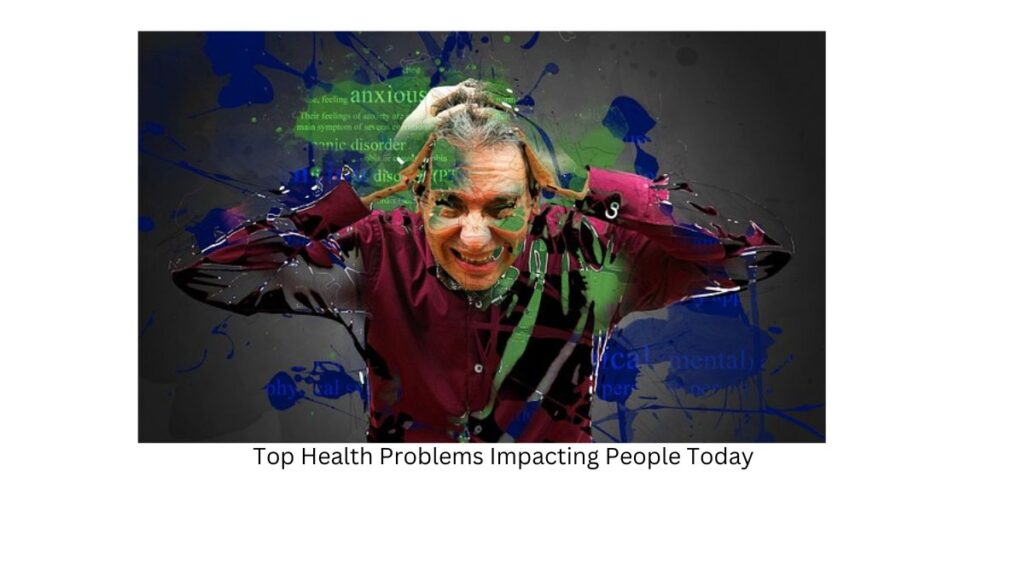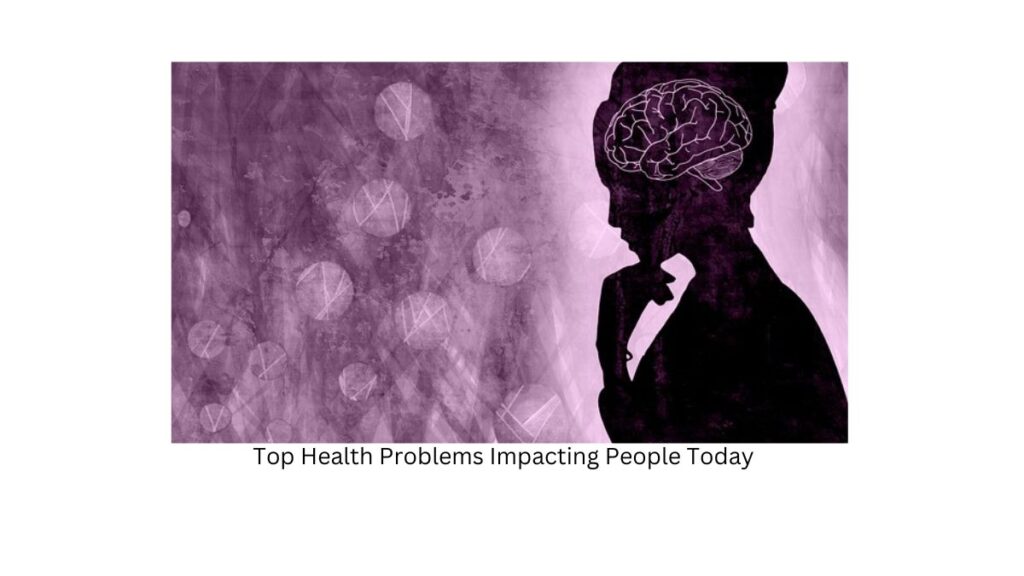Introduction:-
Top Health Problems Impacting People Today

In our fast-paced and increasingly complex world, health issues have become a major concern for people across the globe. From lifestyle-related problems to emerging health threats, understanding the top health problems impacting individuals today is crucial for promoting well-being and making informed decisions about our health. This article explores the most pressing health challenges of our time, their causes, and what we can do to address them.
What are today’s top health problems?
- Obesity: The Global Epidemic
Obesity is a leading health problem impacting millions worldwide. The excessive accumulation of body fat not only affects physical appearance but also increases the risk of serious health conditions such as heart disease, diabetes, and certain cancers. Sedentary lifestyles, poor dietary choices, and a lack of physical activity are key contributors to this epidemic.
- Heart Disease: The Silent Killer
Heart disease, including conditions like coronary artery disease and heart attacks, remains a top health concern. Factors like high blood pressure, high cholesterol levels, smoking, and obesity significantly contribute to heart problems. Preventive measures such as regular exercise, a heart-healthy diet, and stress management are crucial in reducing the risk.
- Type 2 Diabetes: A Growing Threat
Type 2 diabetes is a rapidly growing health problem, closely linked to obesity and sedentary lifestyles. This chronic condition affects the body’s ability to regulate blood sugar levels and can lead to severe complications if not managed properly. Lifestyle modifications, including a balanced diet and regular exercise, are key in preventing and managing diabetes.
- Mental Health Challenges: The Silent Struggle

Mental health issues like depression, anxiety, and stress have garnered increased attention in recent years. The fast-paced nature of modern life, coupled with societal pressures, has led to a rise in mental health challenges. Promoting mental health awareness, seeking support when needed, and practicing self-care are essential steps to address these issues.
- Substance Abuse and Addiction: A Grave Concern
Substance abuse, including drugs and alcohol, poses significant health problems worldwide. Addiction can lead to physical and mental health issues, strained relationships, and legal troubles. Access to addiction treatment and support is vital for individuals struggling with these challenges.
- Respiratory Problems: The Impact of Air Quality
Respiratory issues, including asthma and chronic obstructive pulmonary disease (COPD), are exacerbated by poor air quality and environmental factors. Reducing exposure to air pollutants, smoking cessation, and appropriate medical care are critical for managing these conditions.
- Cancer: A Pervasive Health Threat

Cancer remains a pervasive health problem, with various forms affecting people of all ages. Lifestyle factors, genetics, and environmental exposures contribute to the development of cancer. Early detection through regular screenings and adopting a healthy lifestyle can help reduce the risk.
- Infectious Diseases: Emerging Threats
Emerging infectious diseases, such as COVID-19, have highlighted the global impact of infectious outbreaks. Vaccination, infection control measures, and public health vigilance are crucial in combating these threats to public health.
- Access to Healthcare: An Ongoing Challenge
Access to quality healthcare remains a concern in many parts of the world. Disparities in healthcare access can lead to delayed diagnoses and inadequate treatment. Advocating for improved healthcare infrastructure and ensuring health equity are essential steps to address this issue.
- Aging Population: Health in Later Years
As the global population ages, issues related to aging, such as dementia and age-related chronic conditions, have become more prominent. Promoting healthy aging through regular medical check-ups, cognitive stimulation, and social engagement is key to addressing these challenges.
The biggest issue in today’s life is health, how can it be solved?
Solving the complex issue of health in today’s world is a multifaceted challenge that requires coordinated efforts from individuals, communities, healthcare systems, and policymakers. While there’s no one-size-fits-all solution, a comprehensive approach can address many of the health problems we face. Here are some key strategies to work towards a healthier society:

- Health Education and Promotion:
- Prioritize health education from an early age to instill healthy habits and awareness of the importance of well-being.
- Promote public health campaigns to raise awareness about the risks associated with unhealthy lifestyles, substance abuse, and mental health issues.
- Access to Quality Healthcare:
- Ensure equitable access to healthcare services, including preventive care, early intervention, and affordable treatment.
- Support programs that provide access to healthcare for underserved populations.
- Preventive Care:
- Encourage regular health check-ups and screenings for early detection of health problems.
- Promote vaccinations to prevent infectious diseases and reduce the burden on healthcare systems.
- Healthy Lifestyles:
- Encourage individuals to adopt and maintain healthy lifestyles, including balanced diets and regular physical activity.
- Create supportive environments for active living and access to healthy food choices.
- Mental Health Support:
- Promote mental health awareness and reduce the stigma surrounding mental health issues.
- Ensure that mental health services are accessible and integrated into healthcare systems.
- Substance Abuse Prevention and Treatment:
- Implement substance abuse prevention programs in schools and communities.
- Provide effective addiction treatment and support for those struggling with substance use disorders.
- Air Quality and Environmental Health:
- Advocate for environmental policies that reduce air pollution and promote clean energy sources.
- Raise awareness about the health impact of environmental factors and encourage sustainable practices.
- Research and Innovation:
- Invest in medical research and technology to develop innovative treatments, therapies, and preventive measures.
- Support research on emerging health threats, such as infectious diseases.
- Policy Changes:
- Implement policies that promote health, including regulations on tobacco and alcohol use, and measures to address obesity and unhealthy food choices.
- Advocate for comprehensive healthcare reform to improve access, quality, and affordability.
- Community Involvement:
- Encourage community engagement in health initiatives, including local programs, support groups, and fitness activities.
- Foster partnerships between community organizations, healthcare providers, and local governments.
- Global Collaboration:
- Collaborate on a global scale to address health challenges, including sharing information and resources to combat infectious diseases and promote global health equity.
- Personal Responsibility:
- Individuals play a crucial role in their own health. Practicing healthy habits, seeking medical care when needed, and being proactive about one’s well-being are essential steps.
Solving health issues in today’s world is a long-term endeavor that requires commitment from all levels of society. It involves not only the prevention and treatment of diseases but also addressing the underlying social, economic, and environmental factors that influence health. By working together, we can build a healthier future for individuals and communities around the world.
Conclusion
The top health problems impacting people today represent a diverse range of issues, from lifestyle-related diseases to emerging health threats. Addressing these challenges requires a combination of individual responsibility, public health efforts, and policy changes. By adopting healthier lifestyles, promoting mental health awareness, and advocating for improved healthcare systems, we can work towards a healthier and more resilient future. It is crucial that we stay informed and take proactive steps to mitigate the impact of these health problems on our lives and the well-being of our communities.





